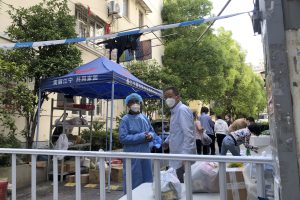In theory, China’s “zero COVID” approach is a top-down policy of the central government under President Xi Jinping. In reality, the task of interpreting and implementing the policy falls largely to subnational government actors. This has prompted the Chinese Communist Party (CCP) to reinvigorate its traditional grassroots governance technique of mass mobilization. But while this has been an effective tool of social control during the pandemic, persistent mobilization threatens to hamper effective administration.
Evolving from the revolutionary “mass campaigns” under Mao Zedong, the modern Chinese state continues to mobilize its grassroots cadres and citizens. Yet rather than seek to reshape ideology as in the past, the aim of present-day mobilization is mostly to reform the way people behave in public, as scholars like Elizabeth Perry have explored. In the COVID-19 context, civilians have mainly been mobilized into getting tested, undergoing quarantine, and handing over their geolocative data.
At the vanguard of this mobilization drive are the lowest tiers of urban government in China –neighborhood residents’ committees and subdistrict offices – as well as local CCP members and volunteers. Their mobilizing efforts have been instrumental in helping Beijing pursue zero COVID – so effective, in fact, that a recent provincial military meeting proposed utilizing COVID-style civilian mobilization in a future war with Taiwan, according to purported leaks.
Yet while campaign-oriented mobilization can be useful in a crisis, it is not a long-term administrative strategy. In the same way that Mao’s concept of “continuing revolution” proved to be disastrous, indefinite mobilization to fight COVID-19 is not proving conducive to good governance. Increasingly across China, people and businesses are enduring cumbersome testing requirements and movement restrictions. Zero COVID is also incurring huge costs for local government and generating vast amounts of waste.
More fundamentally, a return to governance by mobilization suggests a shift away from the rational-bureaucratic approach to administration that has characterized China’s post-Mao era. At lower levels of government, officials are now incentivized to double down on Xi’s hardline approach, not because of any public health rationale, but as a way to show political loyalty to the center. Yet local officials are simultaneously (and somewhat paradoxically) being pressured to safeguard economic growth. This is reportedly leading to administrative paralysis, and evokes another resurgent Mao-era legacy: the “red versus expert” debate of the 1950s and 1960s.
Recent events in Shanghai illustrate the revival of this political-technical tension in local governance. As the city’s COVID-19 outbreak escalated in March, a local infectious diseases expert, Zhang Wenhong, called for a more sustainable and intelligent approach to managing the highly infectious Omicron strain. However, the Harvard-educated Zhang soon disappeared from public view just as Ye Caide, a little-known community health official from Beijing’s Fengtai district, rose to prominence. Ye was deployed to Shanghai, where he spearheaded tightening controls in the city. But this sparked fierce backlash from internet users, who suspected Ye of benefiting from family connections to Sun Chunlan, the vice premier appointed to manage Shanghai’s COVID-19 crisis.
Ye’s rise exemplifies how certain grassroots actors have been empowered by the pandemic. In Shanghai and elsewhere, local officials have enjoyed considerable authority to interpret policy from above, so long as they are contributing to the overarching zero COVID cause. But this single-minded approach has led some cadres to take excessive and heavy-handed measures, from indiscriminately spraying disinfectant to erecting barricades and even killing pets. Anecdotal reports suggest that some residents’ committees have extended local lockdowns in violation of official guidelines.
Such excesses have triggered unrest that is subsequently dealt with through “stability maintenance” – that’s official-speak for dealing with contentious issues and events. Residents’ committees again play a crucial role in this aspect of governance since they allow higher-level authorities to maintain a distance from lower-level overreach. Indeed, as Shanghai reopened on June 1, municipal government representatives denied that the city was ever in lockdown, claiming that the actions of residents’ committees were a result of residential autonomy, not government directives.
But as Ching Kwan Lee and Yong Hong Zhang have written, the centralization of power in China means that social unrest must always turn to the state as both the source of and solution to people’s dislocation and deprivation. In their view, these conditions have led to a strategy of “bargained authoritarianism,” whereby local authorities offer incentives to keep citizens peaceful and thereby maintain stability. Amid COVID-19, such incentives have taken the form of unemployment benefits for laid-off workers and tax relief for shuttered businesses. Protests against COVID restrictions in parts of Shanghai, Beijing, and Tianjin, as well as the Beijing commuter town of Yanjiao, all appear to have yielded concessions through negotiation.
In this way, grassroots engagement has been effective at quelling anger over zero COVID, but also threatens to undermine good governance. Persistent bargaining through financial rewards and concessions can encourage paternalistic behavior, as Luigi Tomba has found. Frequent contention at the grassroots can also leave officials and citizens feeling diminished and resentful, which may in turn create new problems of governance. As Lee and Zhang conclude, “the authority of the authoritarian state suffers, with uncertain implications for regime durability.”

































